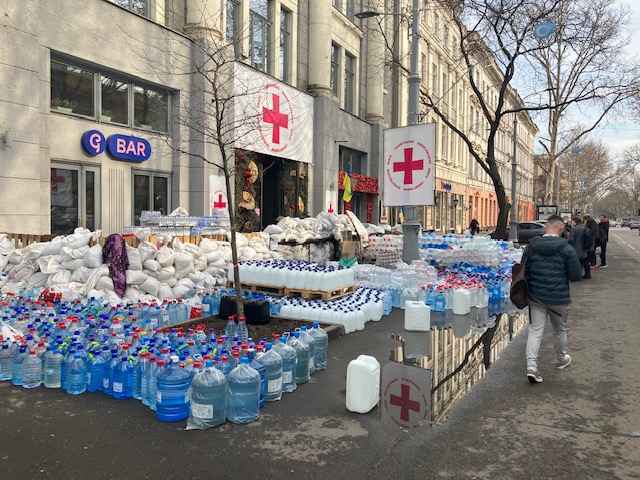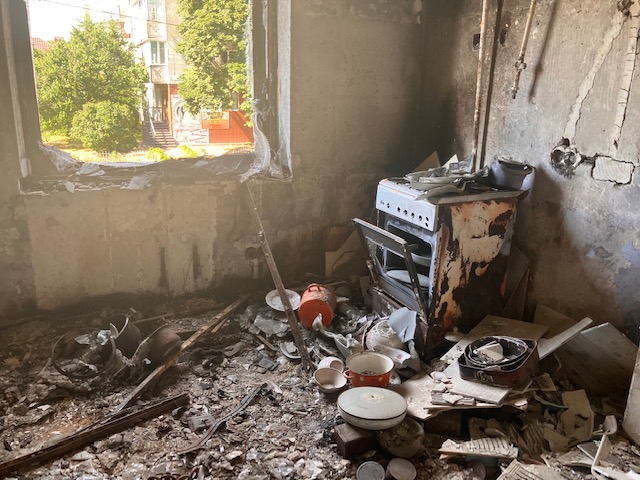Camilla Boemio: The depiction of war is a recurring theme in photojournalism, providing the news, which overcoming with a freeze-frame the expressive short circuit of horror that does not always find words to be described. Unfortunately, society often stops making the image spectacular as if it were a video game or a blockbuster film. How can we tell what’s happening in Ukraine?
Zarina Zabrisky: Thank you for this question. Documenting the reality and not going for sensationalism is a challenge for a war journalist. When you are photographing the corpses of the Russian soldiers left in the field, how do you avoid it being graphic? When you are working on a site that was just bombed, how do you avoid being dramatic? The scene often looks more like a Hollywood war movie than reality. I don’t know the answer but I am finding that focusing on details and nuances helps capture the complexity of life during the war. Epic shots of burning cities might induce horror but a half-smile on the bruised face of a pregnant woman rescued from under the rubble of her home says more. An old lady gardening against the backdrop of the sky black from the explosion. A toddler in a sky-blue dress next to a rusty Russian tank in Kyiv on Ukrainian Independence Day. Odesa’s Mayor’s eyes at the site of a destroyed building where a baby was killed, on Easter Day. A puff of smoke from a cigarette, during a mass grave exhumation in Izium. I am a writer, first and foremost, and for me, it is all about the story. The story is: Ukrainian people fight back against a brutal aggressor and survive. They are excruciatingly beautiful in their bravery.
C.B.: What was your first experience with photography?
Z.Z.: When I was a child, my father had a film camera and he taught me to develop black-and-white photos in the darkroom. I still remember the smell and the magic of it. It was fun but the photos were nothing to write home about. My dad loved photography, and I have collections of his slides from traveling around. I started to snap photos with my mobile phone about ten years ago because I wanted to get the details of the scene so I can then write and then I realized the richness of the unwritten story and appreciated it a lot, grew to love it. Once, in Hong Kong, I lost my phone so I wrote a story trying to recreate the photos I took from memory and then an artist illustrated that story… so for me, the image and the words are almost one. I also worked a lot with photographers as a model and a makeup artist and I know that real professional photography requires a lot of technical knowledge and special equipment. My partner is a professional photographer and I hear so much about the light, exposure, lenses, and also post-production. I would love to learn all this… maybe.
C.B.: Can you describe your photo series, please?
Z.Z.: My Ukrainian photo series is an image blog, really. I walk with my camera ready and snap photos left and right throughout the day. Every moment is precious, every scene I want to keep for everyone to see. Say, I walk to Privoz, Odesa signature market, to buy apples: there, I snap photos of colorful displays of dried apricots and candies, giant tomatoes and puffy cakes, portraits of ladies knitting woolen socks, try to catch an image of a proud cat who just caught a mouse and the whole market is cheering… and then the air defense shoots an Iranian kamikaze drone over my head, so I try and catch that moment but miss the flames and smoke and end up with the white arc across the sky and a little puff. Or, I walk in Kharkiv in the dusk, taking photos of ruined facades, Christmas decorations still up in September, and the darkness that envelopes downtown because there is no electricity, trying to figure out how to capture that… It is really a visual diary of a journalist reporting on the war.
C.B.: How can you penetrate the collective imagination?
Z.Z.: Probably, by being aware of archetypes. I give you an example: one of the most popular songs in Ukraine these days is a song about the witch cursing the enemy. It is written as a chant, with repetitions, and folk motifs. It is incredibly powerful and resonates with the listener on a deep, subconscious level. “You will perish in our lands, you will die in our forests… Enemy, what the witch says, so will be.” A portrait of a young green-eyed woman at a Kharkiv animal shelter, with a rescued black cat on her shoulder, has similar power, even though we might not realize it.
And then colors and shapes in images. A lemon on a blue tablecloth or a sea of golden sunflowers against the clear sky can say more than a Ukrainian flag. Kids in yellow and blue dancing to the military orchestra. Blue rubber gloves like outstretched hands next to a wooden cross and an empty grave in Izim. An injured grasshopper hanging to the glass of the window in Kharkiv. From my essay: “Back in my room, I looked out of the window. The sky was flaming red. A golden cupola of a church was shining. On the other side of the glass sat a green grasshopper, a big one, more like a locust, with one hind foot only. It was holding on the glass and I took two photos: in one, I zoomed in and the insect was oversized, taking over the sky and the building behind it—an invader. In the other photo, I changed focus and it was the city in all its baroque Soviet grandeur, with the invader diminished, almost invisible, just a bug. I felt sorry for the locust left behind on the cold glass.”
You can see how the images and photos come together in this essay: https://gregolear.substack.
C.B.: You are a hero. Can you introduce to us how are you living and helping people?
Z.Z.: I appreciate your kindness but I really am not a hero. The heroes are the brave men and women fighting at the front, living in trenches, and dying for their freedom and country. I am in awe of them—I wanted to join the Foreign Legion when the war started but I realized that I am more useful reporting and bringing the truth about this war to the world. I am trying to help as much as I can by making Ukrainians’ stories and voices heard and seen. For that, I travel around Ukraine and document as much as I can. I write for several newspapers, do podcasts, and my Ukrainian colleagues and I just founded an English-language YT channel to tell these stories, in hope that people around the world can support those in need. Say, the animal shelter in Kharkiv needs help desperately or a volunteering organization Nova Ukraine delivers food and medicine to the newly liberated areas, where people live without electricity, water, or Internet. Hopefully, someone in the EU or US will be moved by these stories to help financially or to demand their elected governments support Ukraine.
C.B.: Photography presents a complicated relationship with reality. Can you introduce this issue, please?
Z.Z.: A camera inserts a glass lens between the observer and the observed—and in that sense, it can become protection. I did write about it in the same essay: “Sasha came and drove me to South Saltivka, the place that was ruined the worst by the Russians, an apocalyptic vision—churned, burned, ruined high-rises, street after street, walls that slid down, baring rooms as they were—a desk, a lamp, a lace curtain flipping in the wind, a dead plant. I have seen this before in Borodyanka by Kyiv and in Serhiivka by Odesa but never got used to it. Holding a camera between my eyes and the horrible sight helped, as usual.
I record it for history. I report it. I see it but I don’t see it—although I do see it.”
This protection turned out to be necessary at the mass graves. In Izium, “we entered the forest. I saw people digging, carrying big black bags, smoking, walking. It was very busy and I started to feel the smell that took over me, slowing everything down, shutting down my brain, like there was no time. There I was, walking, taking photos and videos, talking to other journalists, yet everything was a slow, weird movie, happening now and then, with all the strings of meaning detached…
People in white and green transparent plastic coveralls dig yellow soil in the rain. I put the camera between me and the pits in the sand. Snap.
It is so quiet that I can hear a grave digger cough. Four of them remove a wooden cross with the number 412 penciled on it and start shoveling the earth. They work in unison, in harmony, a well-oiled machine. The yellow sand is flying in the air. Soon one of the diggers jumps inside the grave. I can’t see what he is doing there. Snap.
All four pull a dead body in a black plastic bag out, using a long, leathery belt. Snap.
A woman in a pink transparent rain jacket lifts a stiff hand. Snap. I put my phone between me and the dead body. I still see it. It didn’t look real, more like a plastic corpse at a Halloween store or in a Hollywood horror film. Empty eye sockets, pasty color, the same as the sand, like sawdust. I am nearsighted and even with my glasses on I don’t see well—I am glad that I don’t. Snap.
…
The woman in pink keeps examining the body, methodically, like a robot. Somebody writes down what she is saying, or maybe she is using a Dictaphone.
I hear distinctly, in Ukrainian, “A male. One black sock.”
Another sock is missing. I don’t have it in me to snap a photo.”
The camera uses light, angles, and science to freeze the moment and preserve it for eternity. In a way, it both kills and immortalizes the moment in time and a segment of space. The photographer becomes the catcher—a light catcher, a meaning catcher, a life catcher, and, at war, a death catcher. There is a moral injury aspect, the ethical component. Do I put the camera down and rush over to help? Is it ethical to catch the moment of grieving, the moment of loss?
And there is the close-up: when you blow up your image in post-production. Then there is a sense of discovery: like in Michelangelo Antonioni’s Blow Up. You find out something you wouldn’t have seen in the moment.
Roland Barthes wrote about photography and the meaning of a photograph better than anybody else, I think. When does the objective in the photograph ends, and the subjective start? The inexplicable in the photograph, the punctum, that little detail that escapes words. That’s what makes it poignant and makes it art.
I often think of Lee Miller, Man Ray’s muse, model, and surrealist photographer who became a war correspondent during WWII. Her photographs left unforgettable impressions on me, more than any other war images. A curtain in the breeze, an empty room, the dead Nazi officers and their families, a group suicide. Lee Miller, naked, in Hitler’s bath: she and her partner were the first ones in his apartment and took a series of photos. This is where the words stop, and the insanity of war–and the punctum–take over.































































